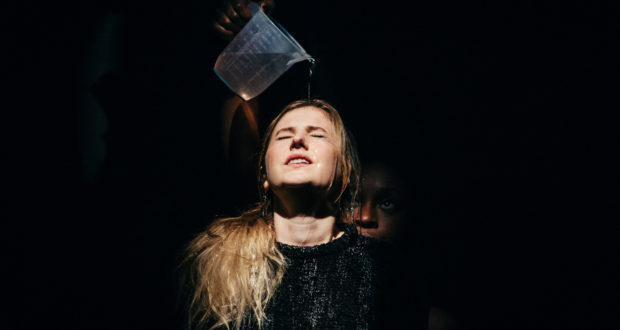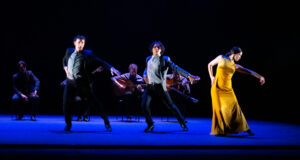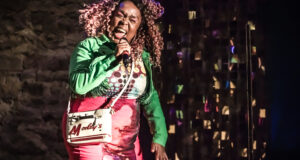Pros: Intricate writing, hard-hitting performances and direction that creates a multi-layered world.
Cons: Every scene is darker than the last and after an hour and forty five minutes this becomes one dimensional. There are no holds barred in this clever and uncompromising portrayal of the brutality of war.
Summary
Rating
Excellent
Bad Roads by Natal’ya Vorozhbit is comprised of six pocket-sized glimpses of how war damages normality; damages relationships; damages humanity and, most specifically, how it damages its women. One element that remains surprisingly vague is exactly which war is under observation. We know through place names and website blurbs that Bad Roads refers to the Ukranian War on Dombass, but that is as far as the nod towards it goes. Does this diminish the opportunity for the Royal Court to magnify and drum up acknowledgement of a war that is still raging? I am inclined to think that, in fact, Bad Roads distances itself from the particulars of this conflict to emphasize the universality of the issue – war is the remit not of one nation but of humanity.
The narrative net is cast broadly from the off and our focus is gradually directed towards individual horrors and the significance of insignificant details. We are drawn into the conflict and the people within it from multiple angles, imperceptibly, so slowly that it’s seductive. The opening sees Woman, a journalist investigating the war first-hand and falling for the soldier who shows it to her. She stands in an imposing set, designed by Camilla Clarke; an ominous and overbearing wood, fir trees you can never see the top of, and never fully understand. The ground is cold, littered and deserted. Through Woman’s monologue, (performed deceptively simply by Kate Dickie) we see, in one fell swoop, the attraction of a war hero, and how that attraction mists judgement.
The people that Woman meets during her investigation are represented by the rest of the cast. They are anonymous in the darkened forest, and speak with foreboding through a microphone. You can barely see them through the trees, but you can hear the rhythm, cadence and variety of their accents ring through. Their lone voices, so different from one another, become a chorus. They hammer in that this – that war – belongs to all of us.
From that opening monologue, Natal’ya Vorozhbit’s script plants repetition and as time goes on these repetitions gain momentum and impact. Seven actors play fifteen characters, and the repeated motifs and interchanges are shared between them all. With that, whose story is whose becomes blurred. Have I seen different people, playing the same person’s story? No. But the stories overlap though the smallest of sentiments, so it’s sometimes difficult to tell. Vorozhbut uses these minute signals to communicate the indiscriminate nature of the atrocities committed under the guise of war.
Each vignette gets darker and darker, until the darkness becomes surreal. Each of them boldly deals with the transformation of power, sex and death into currency. All of which are universally affecting. Bad Roads throws us into the obscenely distorting hierarchy of war. Soldiers become god like, while women become as disposable as chickens. Everything and everyone swells with desperate greed until no one is recognisable as the person they were before war, they are only recognisable as war itself.
In honesty, this all makes for a heavy hour and forty five minutes. The programme describes Bad Roads as “bitterly comic”. It’s certainly bitter, but the didactic thrust of it wins out over any comedy, for sure. It represents multiple stories, and to accomplish this it depends upon a sense of detachment. Therefore, we never get to know the people, we are not given a chance to feel sorry for them, to empathise or to care. The horror of their situation hits you square in the heart for the first couple of vignettes, but loses its hit with age and repetition.
Author: Natal’ya Vorozhbit, translated by Sasha Dugdale
Director: Vicky Featherstone
Booking Until: 23 December 2017
Box Office: 020 7565 5050
Booking Link: https://royalcourttheatre.com/whats-on/bad-roads/
 Everything Theatre Reviews, interviews and news for theatre lovers, London and beyond
Everything Theatre Reviews, interviews and news for theatre lovers, London and beyond



